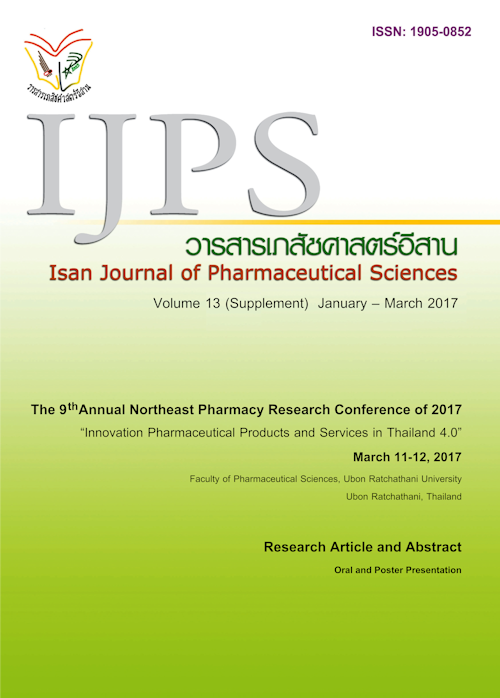Effects of an Empowerment Promotion Educational Program on MothersU Perception of their Empowerment, SelfXEfficacy, Behavior, and the Health Status of Newborns
Main Article Content
Abstract
Introduction: There are a lot of health status problems for newborns with very low birth weight. Appropriate care form their mothers could prevent these problems. The purpose of this experimental research was to determine the effects of an empowerment promotion educational program on mothersi perceptions of their empowerment, self-efficacy, behavior, and the health status of newborns. Methods: The samples were 30 mothers of very low birth weight newborns and their newborns with birth weight less than or equal to 1500 grams admitted to a neo-natal unit who met the inclusion criteria. They were randomly allocated into an experimental group (n = 15) received a health education program to increase empowerment of the mothers and a control group (n = 15) received usual nursing care. Data collection instruments were an interview questionnaire. Data were analyzed using descriptive statistics and multiple regression. Results: Results of multiple regression analysis, controlling for education, occupation, and pretest scores showed that the mean scores of the empowerment perception (p<.001), self-efficacy (p<.001), and mothersi behavior (p<.001) of the mothers in the experimental group were significantly higher than those in the control group. The multiple regression analysis, controlling for newbornsi characteristics and mothersi characteristics which were different between the two groups at the baseline showed that two weeks after discharge, there were no significant differences between the two groups in health status, head circumference, length, and body weight, and that three months after discharge there was no significant difference between the two groups in head circumference, length, and body weight. However, at three months after discharge, the mean scores of the health status of newborns in the experimental group was significantly higher than that in the control group (p <.001). Conclusion: Therefore, the health education program should be useful for infants and infants with very low birth weight.
Article Details
In the case that some parts are used by others The author must Confirm that obtaining permission to use some of the original authors. And must attach evidence That the permission has been included
References
AkakulT.Behavioral and Social science research methodology. UbonRatchathani: Ubon Ratchathani Rajabhat University. 2000.
Blackburn S. Problems of preterm infants after discharge. JOGNN. 1995; 24(1): 43-49.
Boontham S. Development and evaluation of a discharge plan standard for low birth weight infants in the neonatal intensive care unit, Songkhla Hospital. [Thesis]. Songkla: Prince of Songkla University; 2011.
Bualuang P. Effects of mothersi empowerment on maternal stress and role in caring for critical premature babies. [Independent Study]. Khon Kaen: Khon Kaen University; 2009.
Gansiri S. Developa clinical nursing practice guideline for empowerment model for mother of prematurel infant. [Independent Study]. Bangkok: Thammasat University; 2007.
Gibson, G.H. The process of empower in mother of chronically ill children, Journal of Advanced Nursing. 1995; 21(6): 1201-1210.
Japakasetr A, Sirikulchayanonta C, Suthutvoravut U, et al. Implementation of a Nutrition Program Reduced Post-Discharge Growth Restriction in Thai Very Low Birth Weight Preterm Infants, Journal of nutrients. 2016; 8(12): 1-14.
Keawsuprasert R. Effects of the maternal empowerment promotion program on maternal ability to care for very low birth weight newborn in a newborn intensive care unit. [Thesis]. Chonburi: BuraphaUniversity; 2012.
Khamchoo K. The effects of a discharge planning program on maternal knowledge, maternal dependent care agency for caring of preterm infants, and infants, health status. [Thesis]. Khon Kaen: Khon Kaen University; 2003.
Koafai S. Effects of maternal preparation on preterm infant care self-efficacy and care behavior. [Thesis]. Chiang Mai: Chiang Mai University; 1998.
Melnyk BM, Feinstein NF, Alpert-Gillis L, et al. Reducing premature infantsi length of stay and improving parent mental health outcomes with the Creating Opportunities for Parent Empowerment (C0PD) neonatal intensive care unit program: A Randomized, controlled trial:
Offcial. Journal of American Academy of Pediatrics. 2006; 118(5): 1414-1427.
Ministry of Public Health. Live birth rates according to birth weight. Public Health Statistics 2014 [cited 2015 Jan 20]; Available from: http://bps.moph.go.th/new_bps/sites/default/files/health_statistics2557.
Nelson, D. and Heitman, R. Factors influencing weight change in preterm infants, Pediatric Nursing. 1986; 12(6): 425-428.
Ngemklei P. The effectiveness of health education program based on empowerment concept for self-care and care of Infant of adolescent mothers, Bangkok Metropolitan Administration Medical College and Vajira Hospital. [Thesis]. Bangkok: Kasetsart University; 2007.
Premjit K. Effects of perceived self l efficacy promotion program regarding newborn care and kangaroo care on child care behaviors of mothers and weight gain of premature infants. [Thesis]. Bangkok: Chulalongkorn University; 2004.
Statistical Information Department, Sunpasitthiprasong Hospital. Live Birth Statistics, 2012-2015. Ubon Ratchathani: Sunpasitthiprasong Hospital, 2016
Viwatwongkasem C. Sample size determination for researches. Thai J Hlth Resch. 1994; 8(2): 121-146.
Yangsukho K. Mothersi needs regarding care of preterm infants at home. [Thesis]. Chiang Mai: Chiang MaiUniversity; 2006.


